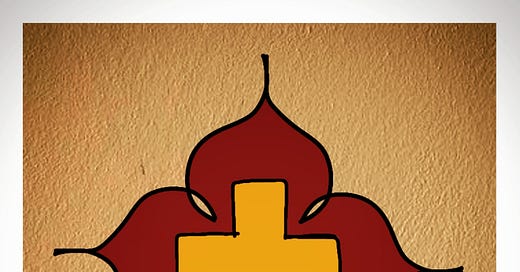Five Tools For Life That You Can Find in Religion
Ethics, Cosmology, the Sacred — Oh My!
It’s common nowadays for folks to prefer to be “Spiritual but not Religious.” That sentiment has loads of merit, and I can appreciate the desire to leave restrictions behind in favor of unadulterated Spirit. How to go about tapping into that well that never dries, however, often takes practice — and while historical models have bent unfortunately toward the patriarchal, they have also provided amazing techniques and psychotechnologies that can benefit us in extraordinary ways.
Because of this, I thought it was worth documenting seven things I absolutely love about religion. For better or worse the Religio binds us together, whether in mutual acceptance or rejection. And while you may be able to find all of these elements outside of religion, you will rarely find them all together and reinforcing one another the way you will in these great traditions.
We dabble and flirt, we reject and embrace, and we party hard in revelry and song.
5. Doctrine
We might as well come right out of the gate with one of the most complicated aspects of the religious life. Doctrine is often the site where people get hung up on metaphysical specifications that can determine, divide, and even discriminate. Thorny territory, to be sure, but said delineations can also provide frameworks for creativity in the inevitable push and pull between heresy and dogma. As people push the limits and either break from or assimilate into their respective traditions, doctrine is the foundational grammar of that language.
Further, as we delve into the various religious practices, doctrine gives the philosophical understanding which facilitates the benefits of said practices. Without it, we wouldn’t have any thing to practice at all. And even if we didn’t have specific creeds or schools for Whitman to hold in abeyance, there are still frequently some sort of a set of assumptions which go into everything from Astrology to Tarot to Witchcraft to BDSM. Cosmologies abound!
4. Scripture
Whether it’s the Christian Gospels, the Hebrew Tanakh, the Buddhist Sutras, The Vedas, The Holy Quran, or the Plays and Epics of the Ancient Greeks and Romans, Scripture offers us a mytho-poetic template for our imaginations’ play, and a call to action with respect to the many morals and ethical principles which abound within our world’s Religious Traditions.
In rich bibliographic traditions you might see the Historical, the Moral / Ethical, the Legal, the Poetical, the Philosophical and the Prophetical all engaged in an interplay with the psyche of the practitioner and their community. There are moral codes, parables, fables, epistles, songs, and meditations all incredibly rich and begging for us to savor them in insight.
In Tarot there is a set of symbolical figures that appear in a seemingly random way as the cards are drawn, although that randomness dissipates during the act of interpretation. Similarly, in Astrology, there is a vast set of myths that accompany the patterns of the stars in the sky — another sort of text to be read, savored, and applied to one’s own life in a manner so as to bring order and coherence to what otherwise might seem a chaotic and inhospitable cosmos.
3. Ritual / Sacraments
Almost all religions have something that you do during a specific point in the day, week, month, or year. These rituals bind us bodily to the earth, to the calendar year, to our histories, and to one another. In addition, they create Holy Spaces and Sacred Items to which we refer, setting them aside for special occasions. Even the most assertively saecular person goes through a few formalities to attend a wedding, give an award, celebrate or protest the results of an election, or go for a walk in a nature reserve.
2. Community
As we partake in all of these forms, we interact with one another in ways at once endearing and provocative. We disagree and splinter into various subsets sometimes never to talk again. We find solidarity and cohere in indelible bonds. We dabble and flirt, we reject and embrace, and we party hard in revelry and song. The Stoics noted that the Sapien is both rational and social — and it is in tradition (or its rejection) that we find ways to celebrate both simultaneously. You might call it a Church, You might call it a Sangha — however you parse it, your practice will be reinforced and strengthened when done alongside others.
1. Prayer and Meditation
Ultimately, what I find to be the best thing about Religion is the Ultimate itself. The concept often referred to as “God” or “Emptiness,” embodied in the Spirit or Breath, can be addressed directly through profound, insight-triggering Meditative practices such as Yoga (Connection, Oneness) and Prayer. These mediations, wherein which we allow ourselves to pause and leave the world of having and doing to return to the Being mode, allow us to become aware of the types of afflictions from which our worldly awareness suffers, in pursuit of an alignment with the Divine.





